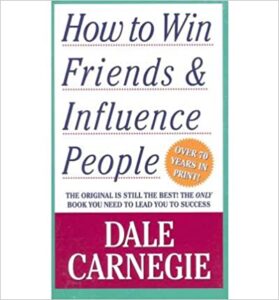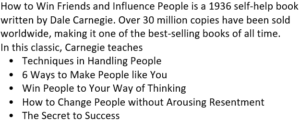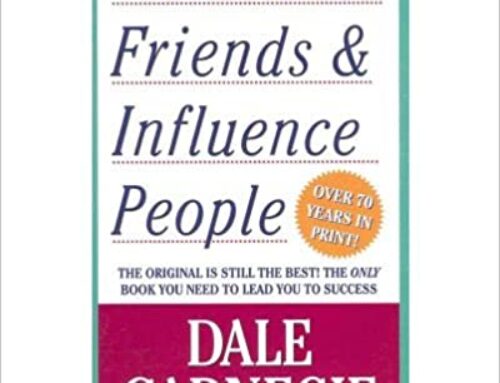
Reading Notes for:
How to Win Friends & Influence People
By Dale Carnegie

When you begin talking, don’t begin on where you differ. Begin by emphasizing and keep on emphasizing what you agree on.
- Make it that you are both striving to the same end – we just differ on the method to get there.
- Keep them saying “yes” – minimize “no” for any reason.
- Keep them moving in an affirmative path.
Socratic Method: Socrates – based on getting yes-yes response.
* Ask question opponent has to agree with, over and over, until he has an armful of agreements.
People who are trying to convince do too much talking, let the other person talk themselves out. They know more about their problems and business than you do. So ask them questions and let them tell you. Don’t be tempted to interrupt. Listen patiently and openly. Be sincere.
If you want enemies, excel (exceed?) your friends. If you want friends, let your friends excel (exceed?) you.
- When our friends excel us, they feel good about themselves.
- When you excel them, some fee envious.
Employer asks “What do you want to get from me as an employer”? “What will you give me in return?” “If I do ____ will you do _____?”
Clothing salesman who showed sketches to client once a week for three years – never bought. So, brought sketches and said “here are some unfinished sketches. Can you help me finish up so they are great?”
- As opposed to trying to sell what I have, get what you want.
Brooklyn Hospital building world class X-ray wing was inundated by equipment salesmen. So one sent letter “We just got new line of X-ray equipment. The first shipment arrived in office. We know not perfect and want to improve upon. Would like you to look upon and give advice. We will send car to get you.”
Remember that other people may be totally wrong but they don’t think so. Be tolerant, patient.
Govern what you say by what you would like to hear.
Magic phrase: I don’t blame you one iota for how you feel. If I were you, I would undoubtedly feel the same way.
Three-fourths of the people you ever meet are hungering for sympathy.
Carnegie did broadcast on Louisa May Alcott and messed up place where she lived. Got rude and angry letter from fan. Called and said “You wrote me a letter about the unforgivable blunder I made the other week. It was a stupid error and I want to apologize for it. It was so nice of you to bring up. Any school child would have known better. I apologized over air and want to do so personally.”
- Of course, she apologized and sympathized.
Old manager who managed temperamental singers handled them with symp0athy, sympathy, sympathy. Big star would routinely call with illness – like spoiled child. So, he didn’t argue. Rush over dripping with pity: “Oh, what a pity, my poor fellow. Of course you can’t sing! I will cancel at once! It will only cost you a few thousand dollars – but that is nothing if you are ill!” Of course, he would sing.
J. Pierpont Morgan – “People generally have two reasons for doing something – a reason that sounds good and the real reason.” Appeal to the nobler motive.
Landlord dealing with tenant breaking least with four months: “Mr. Dole, I have listened to your story and I don’t believe you intend to move. Years in the renting business has taught me about human nature. I sized you up immediately as a man of your word. Here’s my proposition on table for a few days. If you still intend to move, fine. I will admit to myself I was wrong about you and accept your answer.”
Appeal to nobler motives.
Famous guy who didn’t like pic of him in paper told the editor “my mom doesn’t like.”
Rockefeller didn’t like photographers harassing kids – “You know how it is, guys, some of you have kids. You know it’s not healthy for the kids to get press.”
Magazine publisher who couldn’t afford to pay a lot offered to donate to charity in place.

